Karolina Hird, Riley Bailey, Grace Mappes, Angelica Evans, and Frederick W. Kagan
Ukrainian Commander-in-Chief General Valerii Zaluzhnyi assessed on November 1 that the war in Ukraine has taken on a positional nature and offered a series of recommendations for Ukraine to restore manoeuvre to the battlespace.[1] In an essay entitled "Modern Positional Warfare and How to Win It" and an interview with The Economist, Zaluzhnyi outlined the current operational environment in Ukraine and noted that, despite several previously successful Ukrainian counteroffensive operations in 2022, the war is now "gradually moving to a positional form."[2] Zaluzhnyi heavily stressed that the current positional nature of the war is largely a result of military parity between Ukrainian and Russian forces, noting that a deep and dramatic Ukrainian penetration of Russian lines will likely not be possible with the relative technological and tactical equilibrium currently between Ukrainian and Russian forces.[3] In his interview with The Economist, Zaluzhnyi acknowledged that technological and tactical parity between opposing forces in Ukraine has resulted in a "stalemate" similar to the case of the First World War.[4] In the more extensive essay on the subject, Zaluzhnyi notably refrained from classifying the situation as a full stalemate and instead framed it as a "positional" war resulting from aspects of this technological-tactical parity.[5] According to Zaluzhnyi, Ukraine's ability to overcome this technological-tactical parity will be contingent on Ukraine's ability to secure five main operational components that have become particularly significant since the summer of 2023 — gaining air superiority; breaching Russian mine barriers in depth; increasing the effectiveness of counterbattery combat; creating and training the necessary reserves; and building up electronic warfare (EW) capabilities.
Zaluzhnyi offered a series of specific tactical solutions to the five aforementioned operational components that have created the conditions for positional warfare, which in his view will allow Ukraine to overcome military parity with Russian forces. Regarding the issue of air superiority, Zaluzhnyi argued that Ukrainian forces need to significantly improve drone capabilities to gain air superiority along the frontline.[6] Zaluzhnyi argued that Ukrainian forces need to overload Russian air defences, neutralize Russian strike drones, and degrade Russian visibility over the front by deploying cheap drones en masse, developing specific drones meant to target Russian strike drones, and employing EW complexes throughout the front.[7] Zaluzhnyi argued that to overcome the challenges of EW use on the frontline, Ukrainian forces need to introduce necessary command and control (C2) processes for EW complexes, increase EW production capabilities, and streamline engagements with volunteer organizations that provide smaller EW complexes to Ukrainian forces.[8] Zaluzhnyi also recommended that Ukrainian forces improve counter-EW measures and develop new drones with EWs in mind.[9] To gain counterbattery superiority, Zaluzhnyi recommended that Ukrainian forces use more reconnaissance and strike drones to improve Ukrainian counterbattery fire and argued that Ukrainian forces need to strengthen GPS support for Ukrainian counterbattery units and increase the number of counterbattery assets.[10] Zaluzhnyi stated that improved sensors, more widespread and varied mine clearing capabilities, and anti-drone equipment will allow Ukrainian forces to more successfully breach Russian mine barriers in depth while under concealment.[11]
Zaluzhnyi also highlighted wider administrative adaptations and domestic developments in addition to his specific tactical battlefield solutions. Zaluzhnyi specifically called on Ukraine to introduce a Unified State Register for draftees, reservists, and those liable for military service to prepare a necessary reserve for Ukrainian forces.[12] Zaluzhnyi more broadly called on Ukrainian officials to incentivize Ukrainian citizens to join the military reserve and expand the number of citizens that Ukrainian forces are allowed to train.[13] Zaluzhnyi also noted that improving Ukrainian C2 and logistics support will be critical to improving operations writ large.[14] Zaluzhnyi stated that the formation of a "single information environment" for C2 through the use of modern information technology will allow Ukrainians to get ahead of Russian forces in terms of situational awareness.[15] Zaluzhnyi particularly highlighted the need for Ukraine to develop its own defense industry to sustain operations, long-range strike capabilities, and an asymmetric munitions arsenal to break out of military parity with Russian forces.[16]
Russian forces are likely preparing for another wave of highly attritional infantry-led ground assaults on Ukrainian positions in the Avdiivka area. A Kremlin-affiliated Russian milblogger claimed that Russian forces near Avdiivka have largely slowed the pace of ground attacks north and south of Avdiivka in favor of heavy indirect fire against Ukrainian frontline positions and near rear areas. Russian forces may be conducting an interdiction campaign against Ukrainian assets in the Avdiivka area, but this heavy fire is more likely air and artillery preparation for the battlefield ahead of another wave of Russian assaults.[17] Other milbloggers also characterized the current Russian operations as “preparatory support,” presumably for later assaults.[18] Ukrainian Tavriisk Group of Forces Spokesperson Colonel Oleksandr Shtupun also notably stated on October 30 that Russian forces are preparing to conduct “meat assaults” (colloquial jargon for infantry-led frontal assaults) near Avdiivka and are training “Storm-Z” assault units made largely of convict recruits for future assaults without equipment.[19]
Russian forces may be preparing to transition to such infantry-led frontal assaults following heavy artillery preparation to compensate for heavy materiel losses in Avdiivka over the course of October. Open-source geolocation project GeoConfirmed used commercially available satellite imagery to verify that Russian forces have suffered at least 197 damaged and destroyed vehicles since October 9, losing 99 vehicles during the first wave of assaults between October 9 and 13, 94 vehicles during the second wave between October 14 and 23, and four confirmed and 18 potentially lost vehicles between October 24 and31.[20] GeoConfirmed characterized the Russian effort near Avdiivka as the costliest Russian effort thus far in the war in Ukraine.[21]
The current situation near Avdiivka is a microcosm of the Russian General Staff’s wider failure to internalize and disseminate lessons learned by Russian forces during previous failed offensive efforts in Ukraine to other force groupings throughout the theater. Various Russian elements have engaged in similarly catastrophic mechanized attacks with infantry-led frontal assaults on fortified Ukrainian positions along several different axes over the course of 2022 and 2023, suggesting that the ultimate fault in the lack of strategic adaptation lies with the General Staff. Russian forces previously suffered significant personnel and materiel losses during an unsuccessful offensive against Vuhledar, western Donetsk Oblast in winter 2022-2023, which was characterized by multiple waves of mechanized attacks against fortified Ukrainian positions.[22] These infantry-heavy assaults completely destroyed the Russian units involved in them, including the 155th Naval Infantry Brigade (Pacific Fleet), which reportedly had to reconstitute several times due to losses suffered near Vuhledar.[23] By contrast, elements of the 1st Donetsk People's Republic (DNR) Army Corps, operating under the command of the Southern Military District's 8th Combined Arms Army, and elements of the Central Military District's 41st Combined Arms Army, have recently conducted analogous costly mechanized assaults near Avdiivka.[24] The fact that two very distinct groupings of forces have engaged in similarly ineffective operations suggests that the Russian military command is struggling to learn and disseminate lessons across the theater or, in the case, even within the same military district.[25] The Russian General Staff is in principle responsible for learning lessons, adapting Russian doctrine, and disseminating lessons and new approaches throughout the force. Chief of the Russian General Staff Army General Valery Gerasimov is ultimately responsible for this failure both in his capacity of chief of the Russian General Staff and as overall theater commander. The contrast between Gerasimov’s failure in this regard and General Zaluzhnyi’s thoughtful and public evaluation of the challenges facing Ukraine and the solutions to them is notable.
Ukrainian forces continued offensive operations near Bakhmut and in western Zaporizhia Oblast on November 1. The Ukrainian General Staff reported that Ukrainian forces continued offensive operations in the Bakhmut and Melitopol (western Zaporizhia Oblast) directions.[26] Russian sources claimed that Ukrainian forces unsuccessfully attacked near Zelenopillya (12km southwest of Bakhmut) and along a section of the railway line between Klishchiivka (7km southwest of Bakhmut) and Andriivka (10km southwest of Bakhmut).[27] A Russian milblogger claimed that Ukrainian forces marginally advanced from Shcherbaky (18km west of Orikhiv) towards Myrne (16km southwest of Orikhiv) and made gains west of Robotyne (10km south of Orikhiv).[28]
Russian Defense Minister Sergei Shoigu reiterated Russian President Vladimir Putin’s framing of ongoing Ukrainian ground activity on the east (left) bank of Kherson Oblast as part of the Ukrainian counteroffensive. Shoigu stated during a conference call on November 1 that Ukrainian forces unsuccessfully attacked in the Zaporizhia, Donetsk, and Kherson directions, grouping Ukrainian activity in the Kherson direction with directions recognized as currently part of ongoing Ukrainian counteroffensive efforts.[29] Putin described Ukrainian activity in Kherson Oblast as the “next [Ukrainian] counteroffensive” and dismissed all Ukrainian offensive operations as failures during a press conference in Beijing on October 18.[30]
Russian forces conducted a relatively large series of drone and missile strikes mainly targeting Poltava Oblast on the night of October 31 to November 1. The Ukrainian General Staff reported on November 1 that Russian forces launched three Kh-59 missiles and 20 Shahed 131/136 drones and noted that Ukrainian air defenses downed all three of the Kh-59 missiles and 18 Shahed drones.[31] Ukrainian officials reported that Russian drones struck an oil refinery in Kremenchuk, Poltava Oblast.[32] Russian sources claimed that Russian forces also struck the Myrhorod airfield in Poltava Oblast.[33] Ukrainian Air Force Spokesperson Colonel Yuriy Ihnat stated that Russian forces are targeting “weak points” in Ukrainian air defenses.[34] Ihnat added that Russian forces are looking at several different courses of action to replenish weapons stocks for continued strikes this fall and winter.
The Russian military appears poised to re-establish its military districts as the primary joint headquarters for its ground forces while transferring naval assets back to the command of the Russian Navy. Russian state media outlet TASS reported on November 1 that sources close to the Russian military leadership stated that the Russian Northern, Pacific, Black Sea, and Baltic fleets and Caspian Flotilla will return to direct subordination under Russian Navy Commander-in-Chief Admiral Nikolai Evmenov on December 1.[35] The Russian Northern Fleet (NF) will also lose its status as a separate military-administrative unit equal to a military district effective December 1, and its ground, aviation, and air defense forces will be transferred to the newly re-created Leningrad Military District. TASS noted that this information has not been officially confirmed. The Russian federal portal of draft regulator legal acts published a presidential decree on October 8, prepared by the Russian Ministry of Defense (MoD), which proposed stripping the NF of its status as a joint "strategic territorial association,” signaling that this change would happen in the future but not specifying a date. [36] It remains unclear how Russia intends to mobilize, train, and organize forces previously under its fleets into new military district-level formations, but this restructuring writ large suggests that Russia intends to reconsolidate control of ground forces under the military district structure, including the newly re-created Moscow and Leningrad Military Districts, while separating the naval assets under the Russian Navy.
Russian sources speculated that Pavel Prigozhin, the son of deceased Wagner Group financier Yevgeny Prigozhin, is officially the acting head of Wagner remnants operating under the auspices of Rosgvardia. Russian regional news outlets reported on November 1 that the Wagner Group has resumed recruiting in Perm and Novosibirsk oblasts under Pavel’s leadership.[37] Russian outlet Ngs.ru reported that a Wagner representative in Novosibirsk stated that Wagner is no longer recruiting criminals or people with illnesses.[38] Russian milbloggers also claimed that Pavel is the new leader of the remnants of Wagner and expressed hope that Pavel’s appointment is an indication that Wagner will survive its subordination to Rosgvardia.[39]
Key Takeaways:
- Ukrainian Commander-in-Chief General Valerii Zaluzhnyi assessed on November 1 that the war in Ukraine has taken on a positional nature and offered a series of recommendations for Ukraine to restore maneuver to the battlespace. Zaluzhnyi offered a series of specific tactical solutions to the five aforementioned operational components that have created the conditions for positional warfare, which in his view will allow Ukraine to overcome military parity with Russian forces.
- Russian forces are likely preparing for another wave of highly attritional infantry-led ground assaults on Ukrainian positions in the Avdiivka area.
- The current situation near Avdiivka is a microcosm of the Russian General Staff’s wider failure to internalize and disseminate lessons learned by Russian forces during previous failed offensive efforts in Ukraine to other force groupings throughout the theater.
- Ukrainian forces continued offensive operations near Bakhmut and in western Zaporizhia Oblast on November 1.
- Russian Defense Minister Sergei Shoigu reiterated Russian President Vladimir Putin’s framing of ongoing Ukrainian ground activity on the east (left) bank of Kherson Oblast as part of the Ukrainian counteroffensive.
- Russian forces conducted a relatively large series of drone and missile strikes mainly targeting Poltava Oblast on the night of October 31 to November 1.
- The Russian military appears poised to re-establish its military districts as the primary joint headquarters for its ground forces while transferring naval assets back to the command of the Russian Navy.
- Russian sources speculated that Pavel Prigozhin, the son of deceased Wagner Group financier Yevgeny Prigozhin, is officially the acting head of Wagner remnants operating under the auspices of Rosgvardia.
- Russian forces continued offensive operations along the Kupyansk-Svatove-Kreminna line, in the Bakhmut direction, near Avdiivka, west and southwest of Donetsk City, in the Donetsk-Zaporizhia Oblast border area, and in western Zaporizhia Oblast and advanced in various sectors of the front.
We do not report in detail on Russian war crimes because these activities are well-covered in Western media and do not directly affect the military operations we are assessing and forecasting. We will continue to evaluate and report on the effects of these criminal activities on the Ukrainian military and the Ukrainian population specifically on combat in Ukrainian urban areas. We utterly condemn Russian violations of the laws of armed conflict and the Geneva Conventions and crimes against humanity even though we do not describe them in these reports.
- Russian Main Effort – Eastern Ukraine (comprised of two subordinate main efforts)
- Russian Subordinate Main Effort #1 – Capture the remainder of Luhansk Oblast and push westward into eastern Kharkiv Oblast and encircle northern Donetsk Oblast
- Russian Subordinate Main Effort #2 – Capture the entirety of Donetsk Oblast
- Russian Supporting Effort – Southern Axis
- Russian Mobilization and Force Generation Efforts
- Activities in Russian-occupied areas
- Russian Information Operations and Narratives
Russian Main Effort – Eastern Ukraine
Russian Subordinate Main Effort #1 – Luhansk Oblast (Russian objective: Capture the remainder of Luhansk Oblast and push westward into eastern Kharkiv Oblast and northern Donetsk Oblast)
Russian forces continued localized offensive operations along the Kupyansk-Svatove-Kreminna line on November 1 and made confirmed gains. Geolocated footage published on October 31 indicates that Russian forces advanced east of Petropavlivka (7km east of Kupyansk).[40] The Ukrainian General Staff reported that Ukrainian forces repelled over 10 Russian assaults near Synkivka (9km northeast of Kupyansk), Ivanivka (21km southeast of Kupyansk), Stelmakhivka (15km northwest of Svatove), and Nadiya (14km southwest of Svatove).[41] Ukrainian Ground Forces Commander Colonel General Oleksandr Syrskyi stated that Russian forces continue their attempts to recapture Kupyansk but have not achieved any strategic success in the Kupyansk direction.[42] A Russian milblogger claimed that Russian aviation in the Kupyansk direction continues to target Ukrainian crossings across the Oskil River.[43] Another Russian milblogger posted footage purporting to show elements of the Russian 1st Guards Tank Army (Western Military District) capturing an unspecified stronghold in the Kupyansk direction.[44] The Ukrainian General Staff reported that Russian forces did not conduct any offensive actions in the Lyman direction on November 1.[45] A Russian milblogger claimed on October 31 that Russian forces made marginal advances in the direction of Yampolivka (17km west of Kreminna) and Torske (14km west of Kreminna), although ISW has not observed visual confirmation of these claims.[46]
Russian sources claimed that Ukrainian forces conducted unsuccessful ground attacks along the Kupyansk-Svatove-Kreminna line on November 1. The Russian Ministry of Defense (MoD) claimed that elements of the Russian Western Grouping of Forces repelled two Ukrainian assaults near Synkivka and that elements of the Russian Central Grouping of Forces repelled two Ukrainian assaults near Hrekivka (20km southwest of Kreminna) and the Serebryanske forest area (10km south of Kreminna).[47] Luhansk People’s Republic (LNR) Head Leonid Pasechnik claimed that Russian forces repelled six Ukrainian assaults along the Novodruzhesk-Hryhorivka line (14km southeast of Kreminna to 11km south of Kreminna), eight Ukrainian assaults along the Berestove-Pereizne line (30km to 28km south of Kreminna), and three Ukrainian assaults along the Vovchoyarivka-Ivano-Darivka line (25km southeast of Kreminna to 23km south of Kreminna) over the past week.[48]
Russian Subordinate Main Effort #2 – Donetsk Oblast (Russian objective: Capture the entirety of Donetsk Oblast, the claimed territory of Russia’s proxies in Donbas)
Russian forces continued offensive operations in the Bakhmut direction on November 1 but did not make any claimed or confirmed advances. The Ukrainian General Staff reported that Russian forces unsuccessfully tried to improve their positions near Klishchiivka (7km southwest of Bakhmut) and Andriivka (10km southwest of Bakhmut) and attacked near Pivdenne (20km southwest of Bakhmut) but did not advance.[49] Ukrainian Ground Forces Command Spokesperson Lieutenant Colonel Volodymyr Fityo noted that Russian forces are bringing reserves to the Bakhmut area to renew active offensive operations after being on the defensive, although ISW has not yet observed indicators of Russian reserves arriving in the Bakhmut direction or the presence of additional Russian troops in the Bakhmut area.[50] Russian milbloggers claimed that Russian forces attacked northwest of Bakhmut from Berkhivka (directly northwest of Bakhmut) towards Bohdanivka (6km northwest of Bakhmut).[51]
Ukrainian forces continued counteroffensive actions in the Bakhmut direction but did not make any claimed or confirmed advances. Russian sources claimed that Ukrainian forces unsuccessfully attacked near Zelenopillya (12km southwest of Bakhmut) and a section of the railway line between Klishchiivka and Andriivka.[52] The Ukrainian General Staff reported that Ukrainian troops continue counteroffensive operations south of Bakhmut.[53]
Russian forces continued offensive operations near Avdiivka on November 1 and reportedly advanced. A prominent Russian milblogger claimed that Russian forces, including mobilized servicemen from Siberia, advanced from positions in Krasnohorivka (7km northwest of Avdiivka) across the railway track towards Novokalynove and Keramik (both about 12km northwest of Avdiivka).[54] A Russian media aggregator claimed that Russian forces advanced west and south of Avdiivka near Sieverne (5km west of Avdiivka) and Pervomaiske (11km southwest of Avdiivka) on October 31.[55] Several Russian sources claimed on November 1 that there is heavy fighting north of Avdiivka near the waste heap area, and one milblogger noted that Russian forces are preparing to begin attacks on the industrial zone of the Avdiivka Coke Plant in northern Avdiivka.[56] A Ukrainian soldier reported that Russian forces are also conducting attacks south of Avdiivka from Vodyane (6km southwest of Avdiivka) towards Sieverne.[57] The Ukrainian General Staff reported that Russian forces unsuccessfully attacked near Avdiivka, Sieverne, Pervomaiske, Keramik, and Stepove (5km northwest of Avdiivka).[58]
Ukrainian forces conducted limited counterattacks near Avdiivka on November 1 but did not make any confirmed advances. Geolocated footage posted on November 1 shows a Ukrainian counterattack north of Krasnohorivka, but the source of the video claimed that Russian forces ultimately repelled the attack and forced Ukrainian troops to withdraw.[59] Russian sources claimed that Ukrainian forces unsuccessfully counterattacked near the waste heap north of Avdiivka and near Krasnohorivka.[60] One Russian milblogger claimed that Ukrainian forces are successfully holding back Russian attacks near Tonenke (6km west of Avdiivka).[61]
Russian forces continued offensive operations west and southwest of Donetsk City on November 1 but did not make any claimed or confirmed advances. The Ukrainian General Staff reported that Russian forces unsuccessfully attacked in Marinka (on the southwestern outskirts of Donetsk City) and near Novomykhailivka (12km southwest of Donetsk City).[62] A Russian milblogger posted footage reportedly of a tank of the 5th Brigade of the 1st Donetsk People's Republic (DNR) Army Corps striking Ukrainian positions in Marinka.[63]
Ukrainian forces conducted offensive operations west and southwest of Donetsk City on November 1 and made a confirmed advance. Geolocated footage published on October 31 shows that Ukrainian forces have advanced south of Novomykhailivka.[64]
Russian Supporting Effort – Southern Axis (Russian objective: Maintain frontline positions and secure rear areas against Ukrainian strikes)
Ukrainian forces did not conduct any confirmed or claimed ground attacks in the Donetsk-Zaporizhia Oblast border area on November 1.
Russian forces continued offensive operations in the Donetsk-Zaporizhia Oblast border area on November 1 and reportedly recently advanced. The Ukrainian General Staff reported that Russian forces conducted unsuccessful assaults near Prechystivka, (19km southeast of Velyka Novosilka) Zolota Nyva (11km southeast of Velyka Novosilka), and Staromayorske (9km south of Velyka Novosilka).[65] A Russian milblogger claimed that elements of the Russian 127th Motorized Rifle Division (5th Combined Arms Army, Eastern Military District) are advancing near Rivnopil (8km southwest of Velyka Novosilka) and that elements of the 60th Motorized Rifle Brigade, likely referring to the 143rd Motorized Rifle Regiment, and the 394th Motorized Rifle Regiment (both of the 127th Motorized Rifle Division) attacked west of Staromayorske.[66] The Russian “Vostok” battalion, which is reportedly operating southeast of Velyka Novosilka, claimed that Russian forces made some advances in unspecified areas near the Donetsk-Zaporizhia Oblast border on October 31.[67]
Ukrainian forces continued offensive operations in western Zaporizhia Oblast on November 1 and reportedly advanced. A Russian milblogger claimed that Ukrainian forces marginally advanced from Shcherbaky (18km west of Orikhiv) towards Myrne (16km southwest of Orikhiv) and made gains west of Robotyne (10km south of Orikhiv).[68] Russian milbloggers claimed that Ukrainian forces unsuccessfully attacked near Novoprokopivka (2km south of Robotyne) and Verbove (18km southeast of Orikhiv).[69]
Russian forces continued limited offensive operations in western Zaporizhia Oblast but did not make any claimed or confirmed advances on November 1. The Ukrainian General Staff reported that Ukrainian forces repelled Russian attacks near Robotyne.[70] Russian sources claimed that Russian forces attacked Ukrainian positions near Verbove on October 31 and November 1.[71]
Russian milbloggers continue to claim that Ukrainian forces hold positions and conduct attacks on the east (left) bank of Kherson Oblast. Russian milbloggers claimed that Ukrainian forces attacked near Poyma (12km southeast of Kherson City and 4km from the Dnipro River) and Pishchanivka (14km east of Kherson City and 3km from the Dnipro River) and that there are meeting engagements near Krynky (30km northeast of Kherson City and 2km from the Dnipro River).[72] Russian milbloggers claimed that Ukrainian forces maintain positions in Krynky, where Ukrainian forces continue to reinforce their positions and where Russian forces conduct heavy air and TOS-1A thermobaric artillery strikes.[73] A Russian milblogger claimed that Ukrainian forces mined the area near Krynky to complicate Russian infantry attacks in the area.[74]
Ukrainian forces targeted Russian rear areas in southern Ukraine on November 1. Kherson Oblast occupation head Vladimir Saldo claimed that Russian forces shot down seven Ukrainian missiles targeting occupied Crimea over occupied Kherson Oblast and that two of the missiles landed in an abandoned area on the Arabat Spit, causing no damage or casualties.[75] Russian occupation authorities deployed smoke screens at the Kerch Strait Bridge presumably in response to the missile threat, but one Russian milblogger characterized the smoke screens as akin to “poultice for a dead person,” remarking on their ineffectiveness.[76]
Russian Mobilization and Force Generation Efforts (Russian objective: Expand combat power without conducting general mobilization)
Russian authorities continue to praise the apparent successes of the Russian defense industrial base (DIB). The head of Russian state-owned defense conglomerate Rostec, Sergei Chemezov, claimed on November 1 that Rostec has increased its production volume of tanks sevenfold, its production volume of armored vehicles by a factor of four and a half, and its production volume of unspecified types of ammunition by 60 times over the past year.[77] Chemezov added that Rostec is fulfilling the Russian DIB’s need for electronic components.[78]
The Ukrainian Resistance Center stated on November 1 that Russia is forming new Rosgvardia units to conduct anti-sabotage measures in occupied Donetsk, Luhansk, Zaporizhia, and Kherson Oblasts.[79] These units will reportedly be based near Voronezh City in Russia and comprised of around 10,000 servicemen, including former Wagner personnel.
Russian Technological Adaptations (Russian objective: Introduce technological innovations to optimize systems for use in Ukraine)
A Russian milblogger claimed on November 1 that individual combat units are driving the increased prevalence of drones and drone operators in the Russian military, not increased resources and attention from the Russian MoD.[80] The milblogger criticized the Russian MoD’s “official view” that drones are more suited for special forces and Spetsnaz detachments as opposed to combined arms formations. Another Russian milblogger criticized the Russian military for giving Russian officials downed Ukrainian drones for their “museums” and not researching and reverse engineering the downed drones.[81]
Activities in Russian-occupied areas (Russian objective: Consolidate administrative control of annexed areas; forcibly integrate Ukrainian citizens into Russian sociocultural, economic, military, and governance systems)
Russian occupation officials continue efforts to control residents’ access to information in occupied territories. Kherson Oblast occupation officials promoted satellite television services through the “Russkyi Mir” broadcasting program on October 31 and claimed that frontline residents would receive 25,000 free Russkyi Mir satellite TV sets by the end of the year.[82] Kherson Oblast occupation chairperson Andrey Alekseenko stated that Russian occupation officials plan to install 55,000 Russkiy Mir satellite TV sets in occupied Kherson Oblast by the end of 2024.[83] The Ukrainian Resistance Center reported that Russian officials use the broadcasting program for propaganda and confiscate residents’ personal satellite dishes to prevent residents from accessing Ukrainian channels.[84]
Russian occupation officials are likely using public health services to coerce residents in occupied territories into receiving Russian passports. Kherson Oblast occupation head Vladimir Saldo stated on November 1 that occupation authorities will start administrating free flu shots in occupied Kherson Oblast and will require residents’ passports for the vaccinations.[85] Russian occupation officials have increasingly denied social services to residents with Ukrainian passports and will likely use public health services to augment ongoing passportization efforts.[86]
Russian occupation officials continue to use various education and vacation schemes to deport Ukrainian children and eradicate their Ukrainian national identity. A Russian milblogger amplified a crowdfunding campaign on October 31 for sending 100 Ukrainian children to the Olympus children’s camp in occupied Crimea and claimed that the crowdfunding campaign has helped 14,000 Ukrainian children vacation in Crimea.[87] The head of the Kherson branch of the “Combat Brotherhood“ veterans organization, Igor Telegin, stated on October 31 that the youth military patriotic organization ”Yunarmia” will send more than 200 members from occupied territories to attend a military education school in Crimea, where they will undergo basic military training.[88]
Russian Information Operations and Narratives
Russian Defense Minister Sergei Shoigu reiterated Kremlin narratives about the “failed” Ukrainian counteroffensive during a Russian MoD conference call on November 1. Shoigu claimed that Russia has defeated the Ukrainian military despite the supply of new weapons from NATO.[89] Shoigu claimed that the Russian military has destroyed 37 Ukrainian aircraft over the past month and noted that this is nearly twice the number of F-16 aircraft that Western partners have promised Ukraine. Shoigu claimed that Russian air defenses should be able to destroy Western-provided F-16s in approximately 20 days. Shoigu additionally stated that Russian forces are conducting “active defense” along the front in an effort to temper domestic expectations about localized Russian offensive operations in various sectors of the front.
A Russian milblogger expressed concern over Russia’s growing diplomatic isolation. A Kremlin-affiliated Russian milblogger expressed concern on November 1 that Serbia may becoming increasingly pro-Western following the dissolution of its parliament and elections in December 2023.[90]
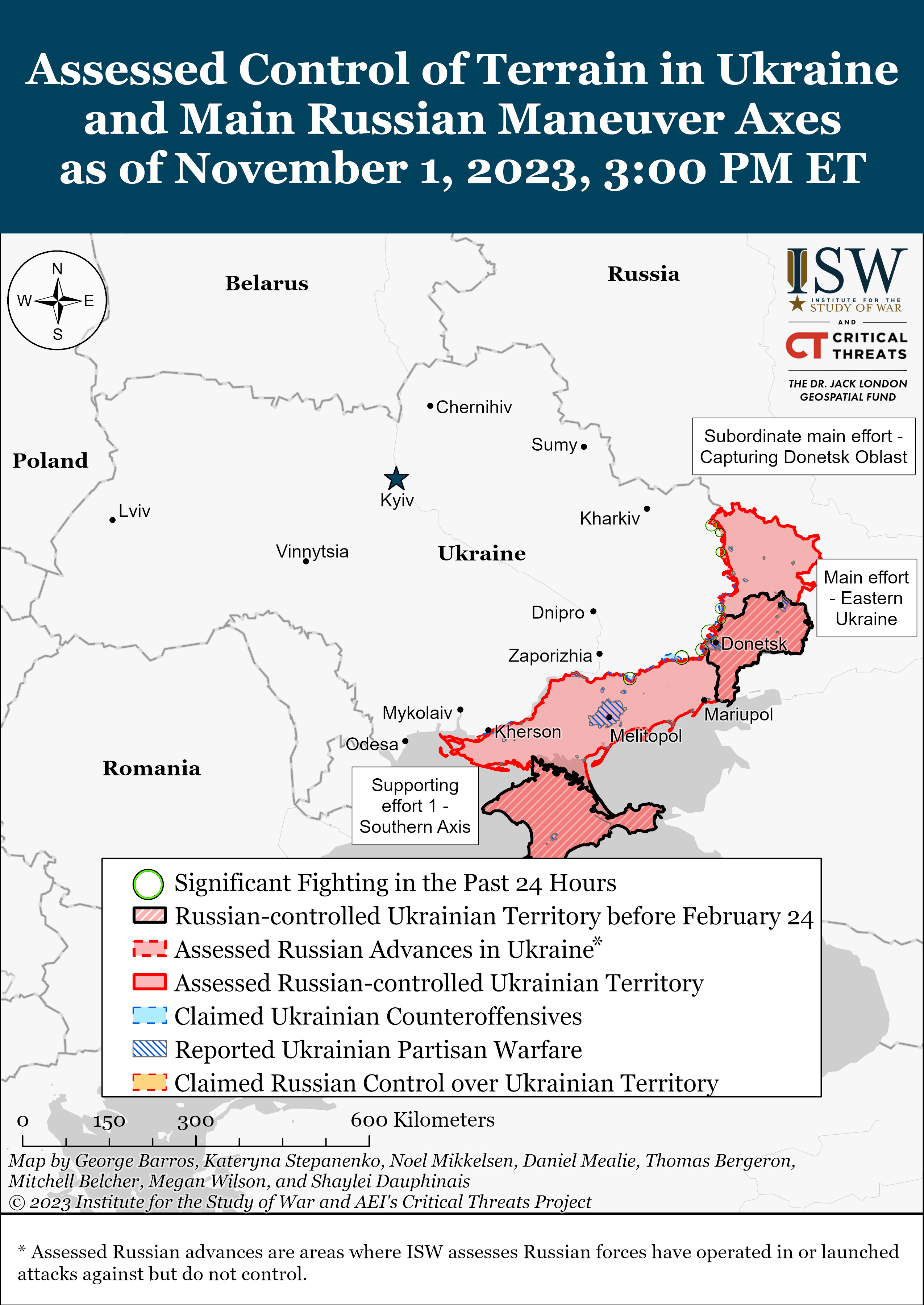
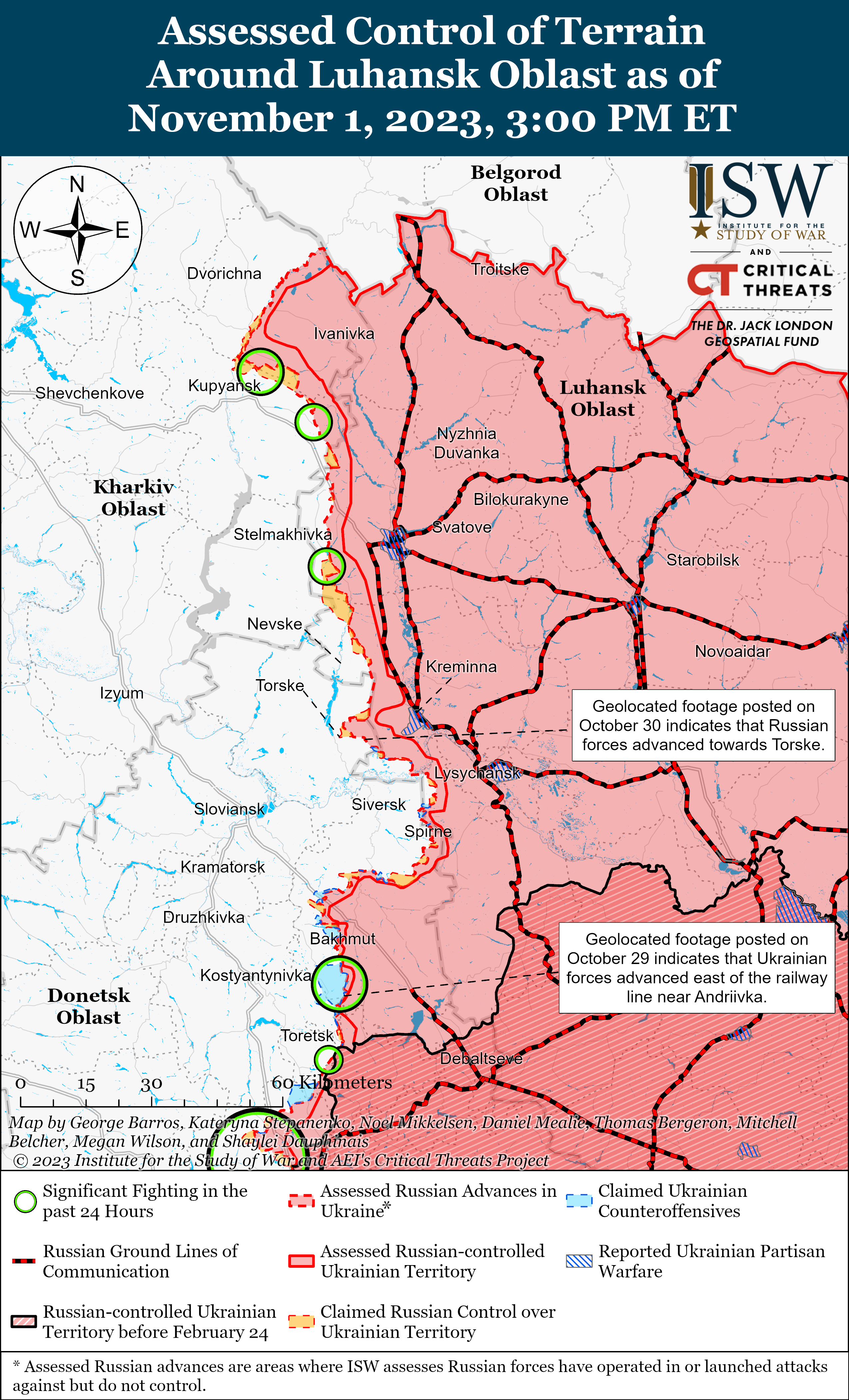
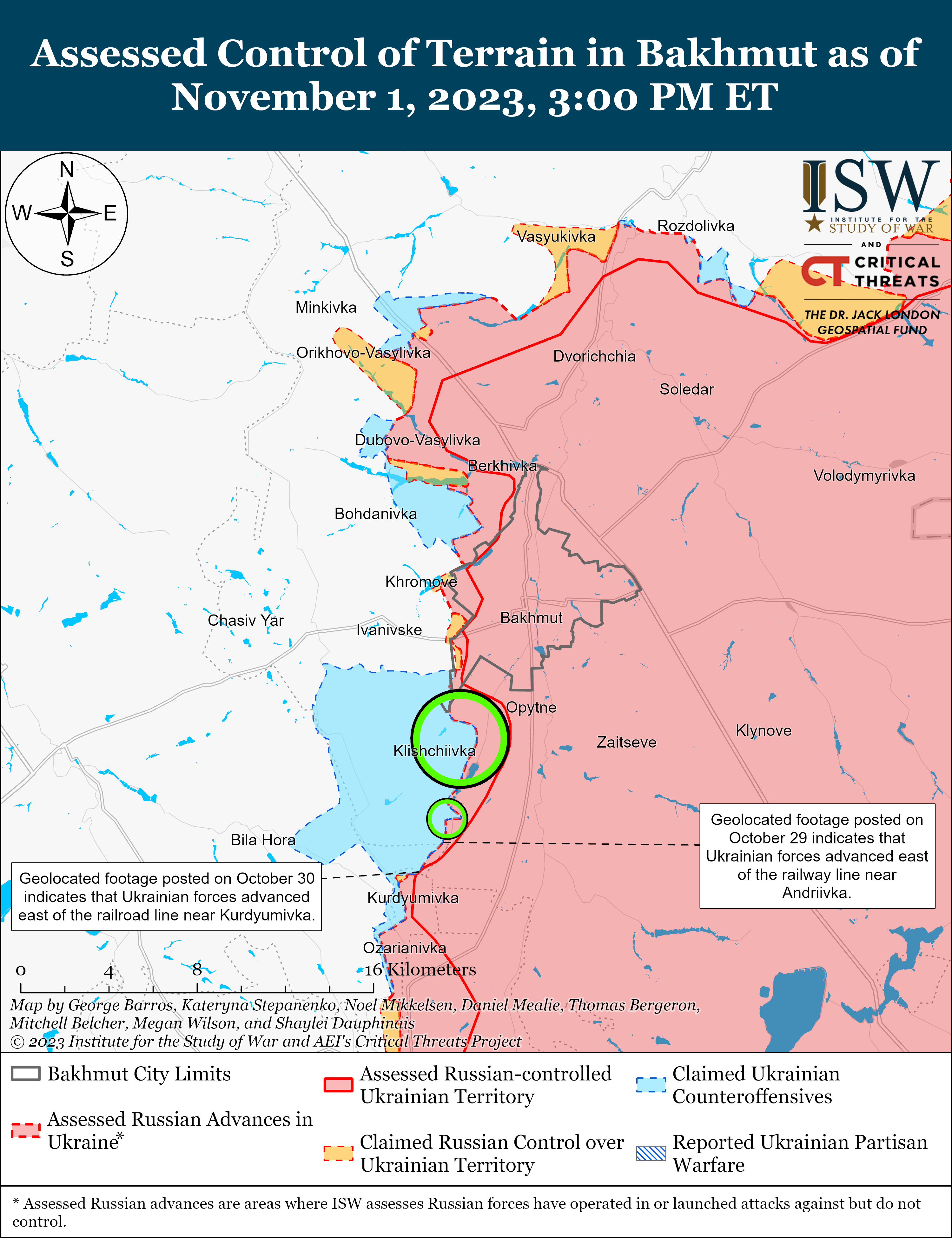
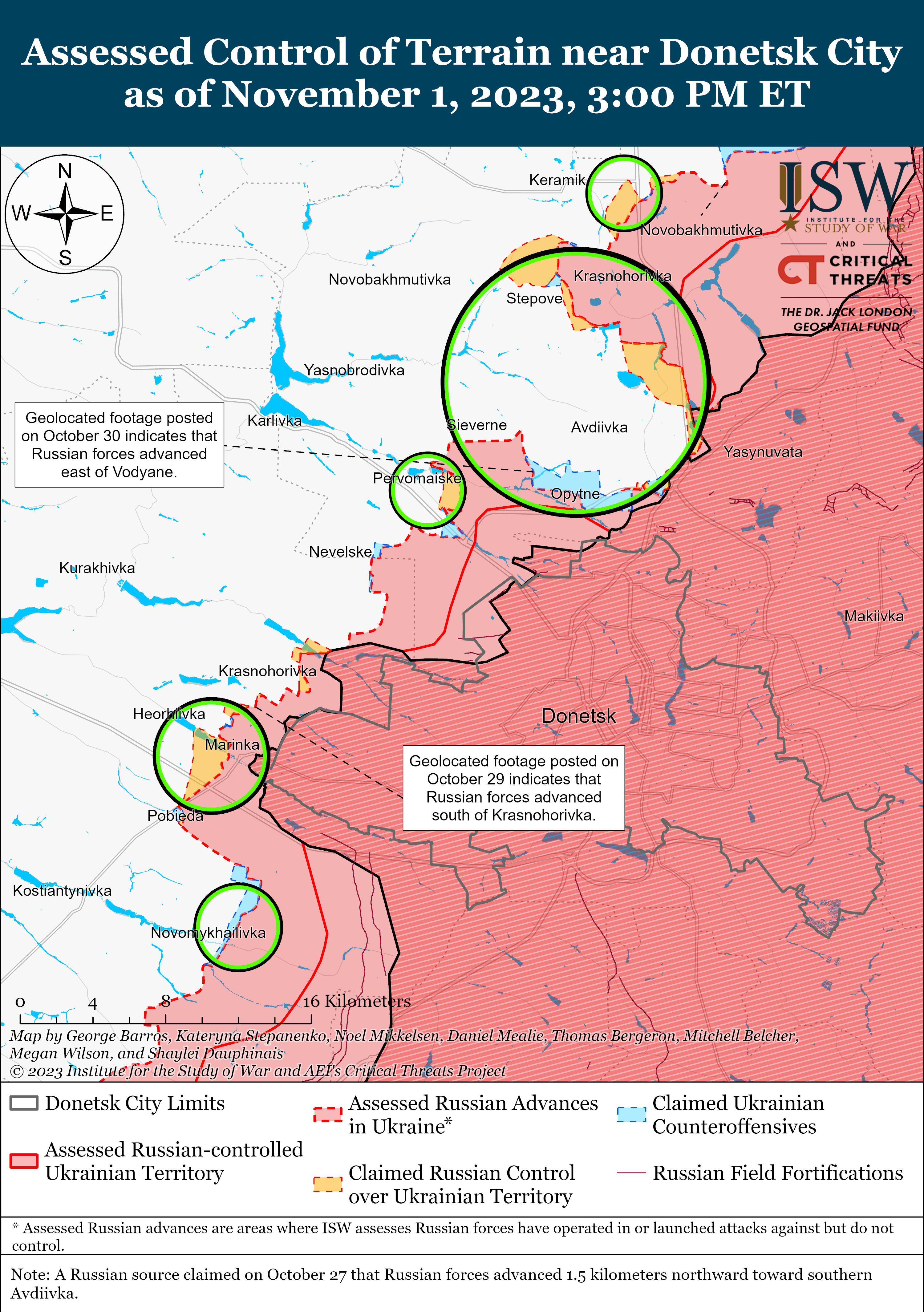
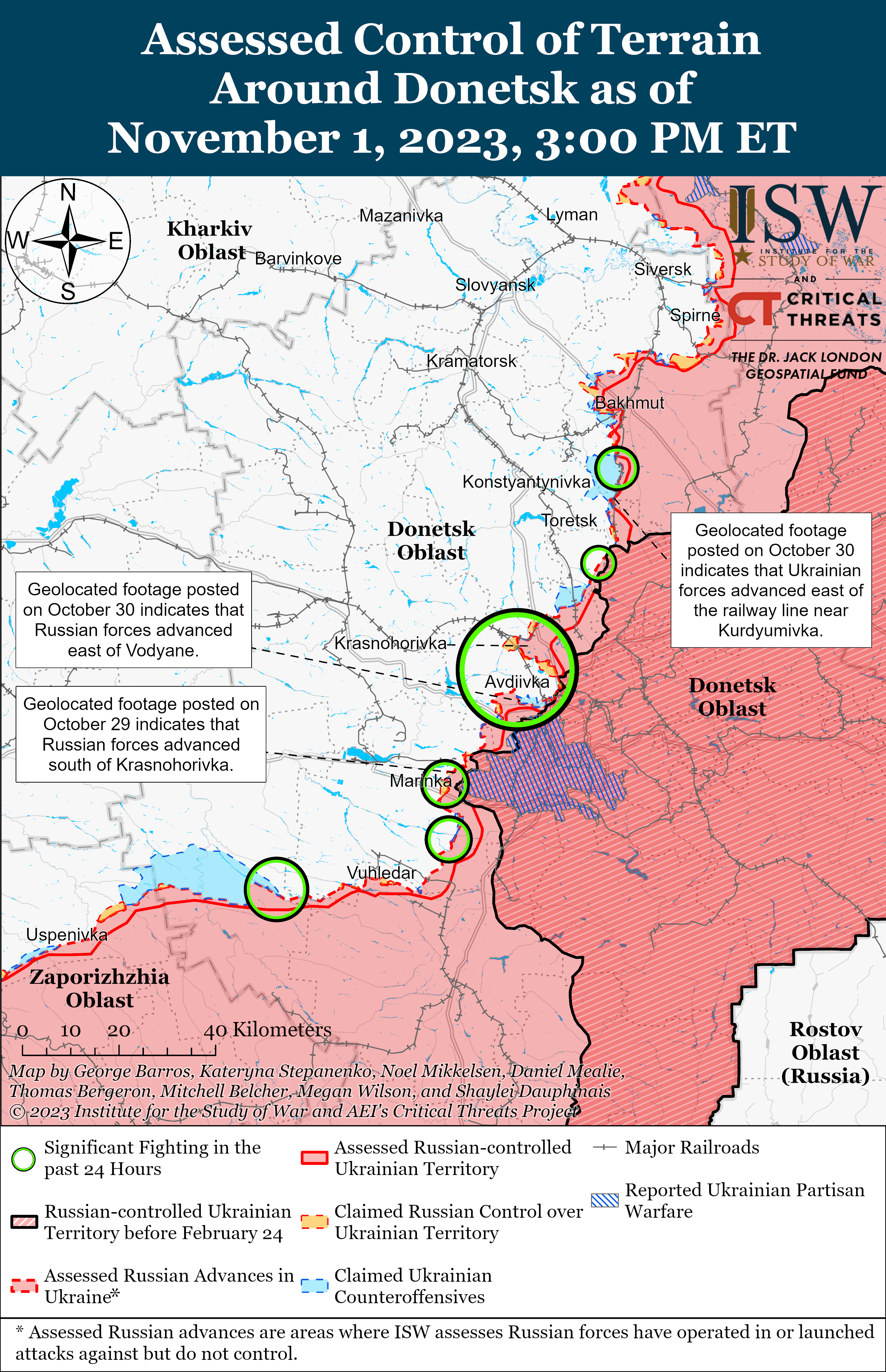
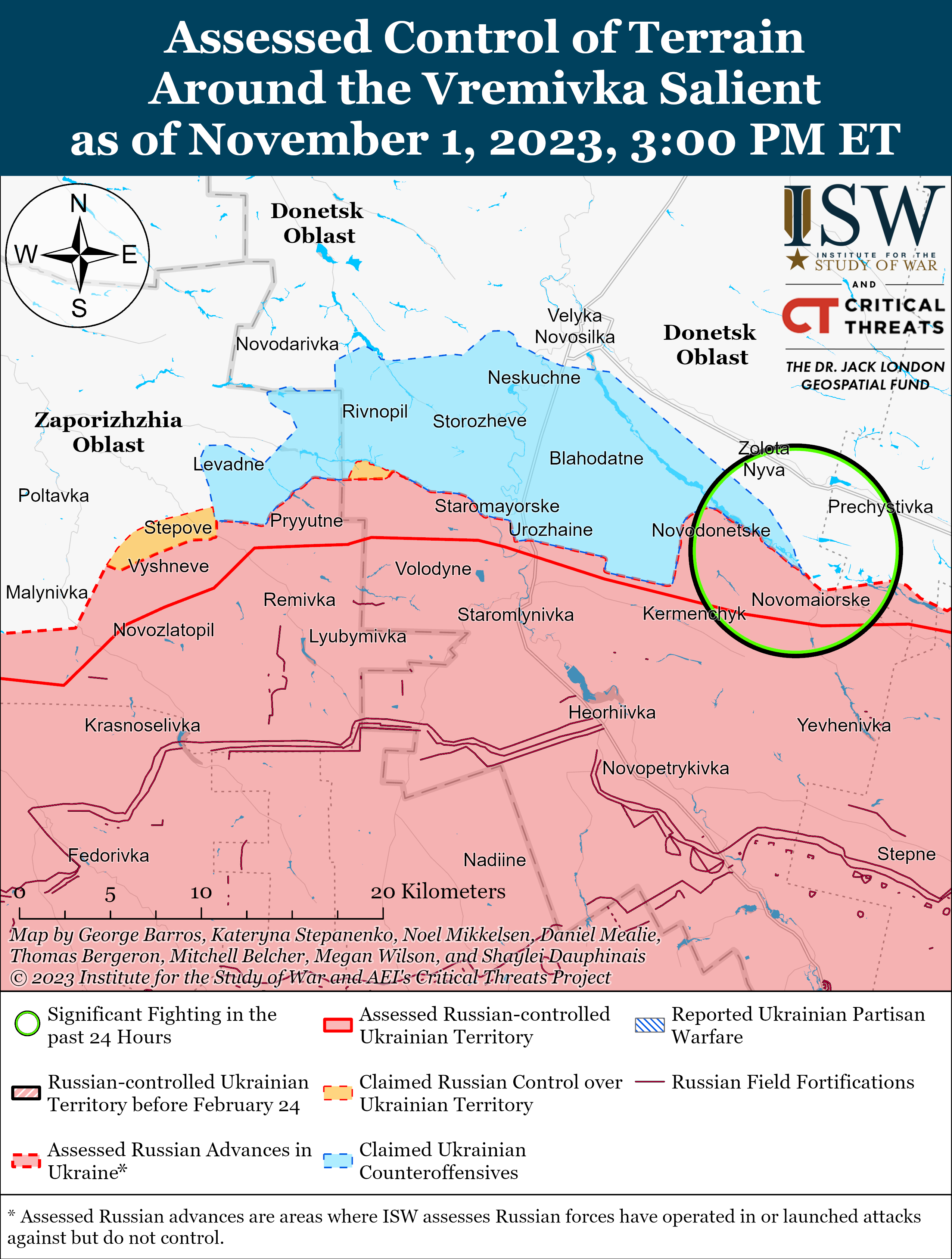
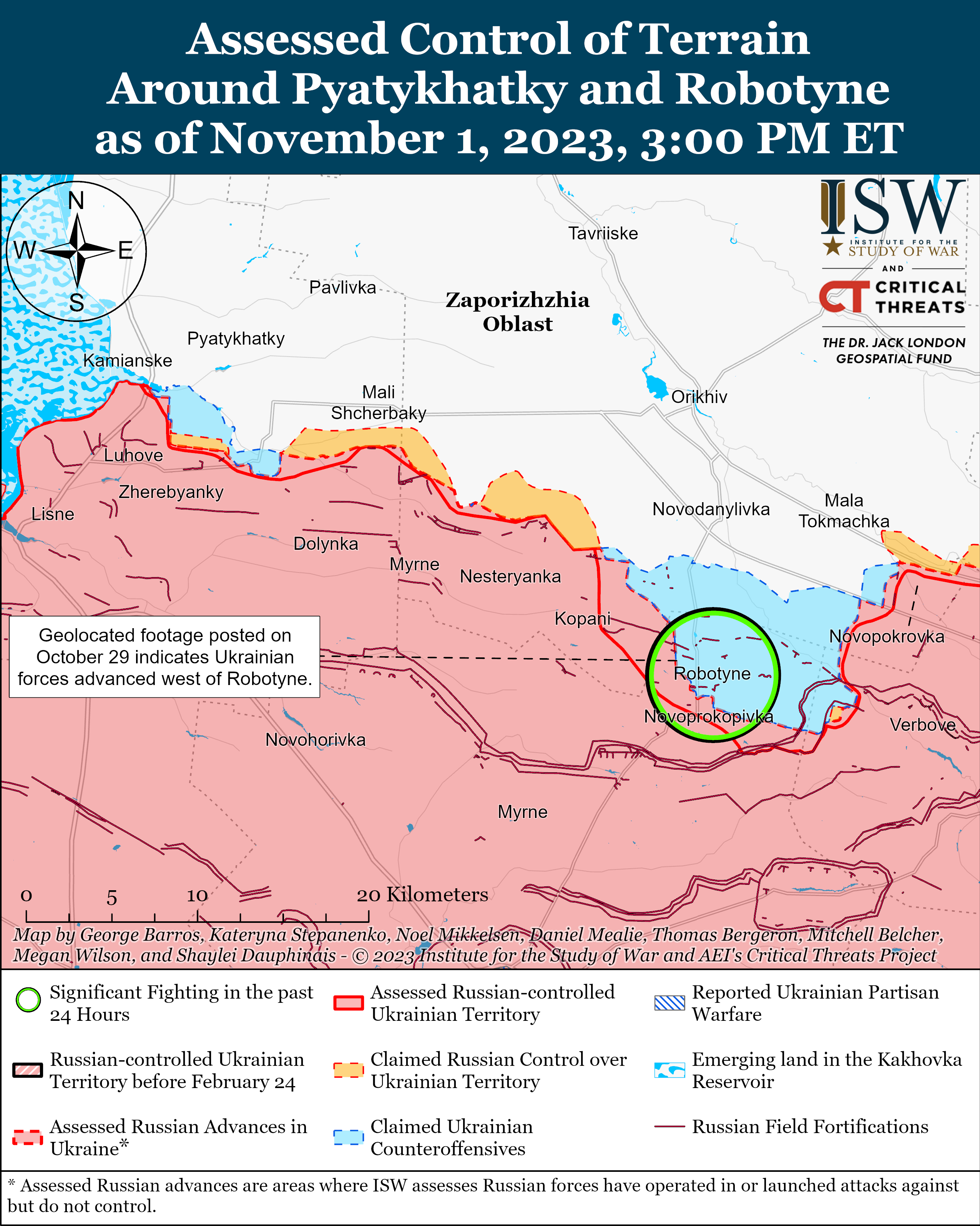
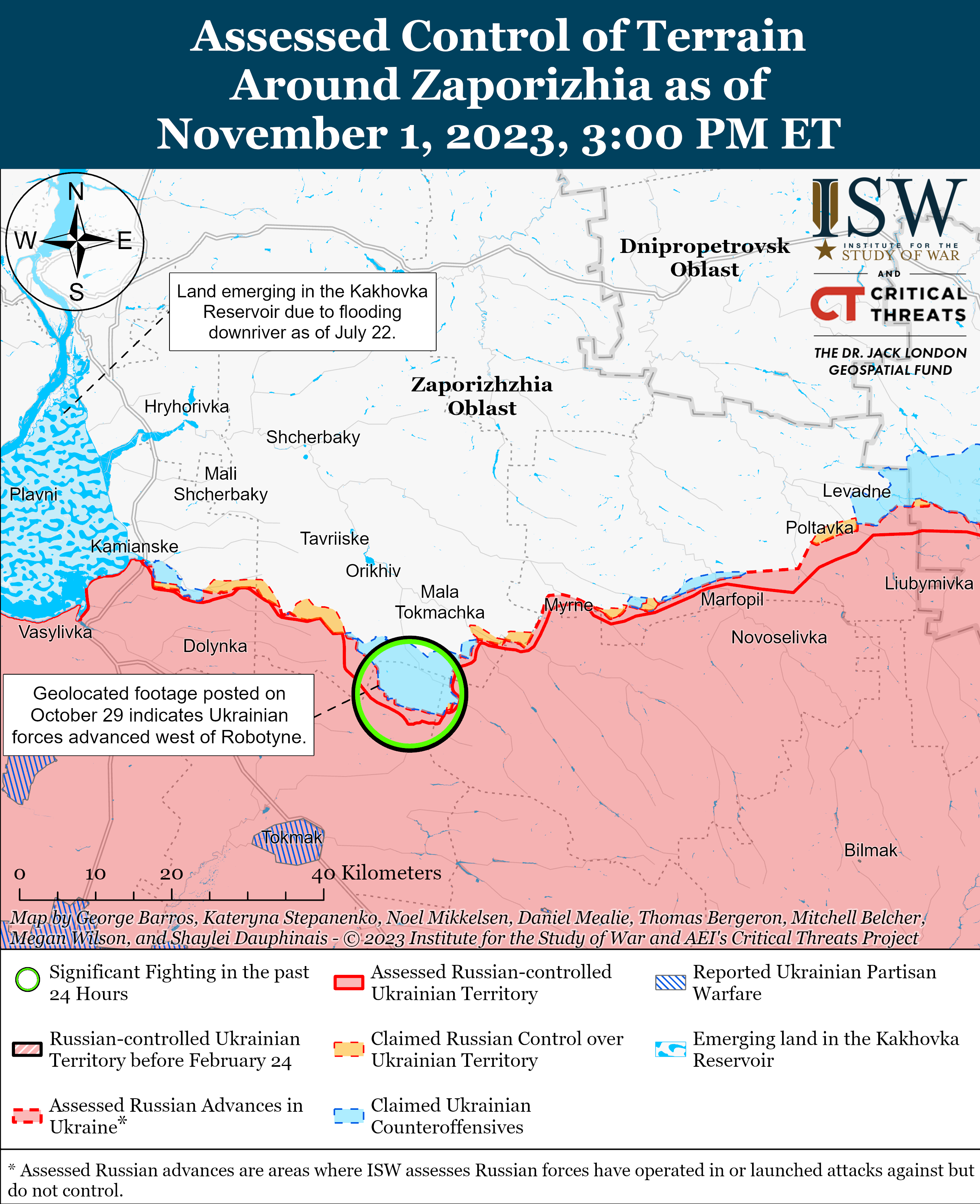
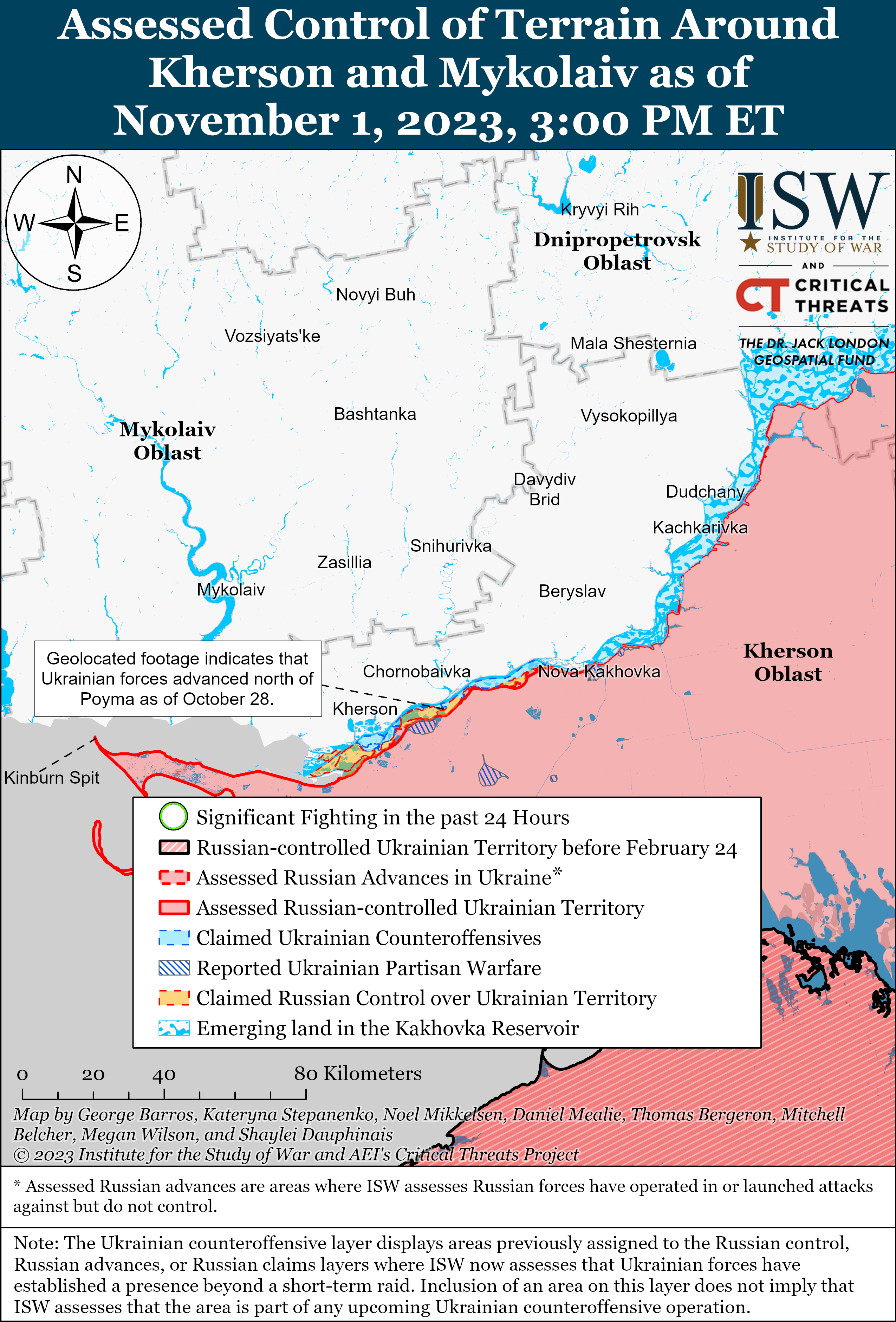
No comments:
Post a Comment